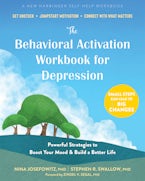by Nina Josefowitz, PhD and Stephen R. Swallow, PhD, coauthors of The Behavioral Activation Workbook for Depression
Our feelings of depression and our mood-busting behavior interact in a vicious cycle. What this means is that not only can our mood-busting behavior keep the cycle of depression going, but—on a much more encouraging note—changing our behavior can interrupt and even reverse the vicious cycle of depression. Changing our behavior can change our mood. Take a moment to think about this. It’s really important.
Change Your Behavior to Change Your Mood
We are going to help you change the behavior that fuels your depression. And the good news is that as you change your mood-busting behavior and begin to engage in more of what we call “mood-boosting behavior,” you will start to feel less depressed and more motivated, and you will have fewer of those negative thoughts that bring you down. In short, you will create a positive cycle of increased activity and improved mood which, over time, will result in a happier, more fulfilling, more depression-resistant life. Certain types of activities are particularly effective at boosting our mood and countering the negativity of depression. We refer to these activities as the building blocks of a good, depression resistant life. They include the following:
· activities that bring us enjoyment or pleasure
· activities that promote physical activity
· activities that involve social connections
· activities that resonate with our personal values
· activities that foster a sense of mastery and accomplishment
· activities that help us face and solve our problems
As you start to engage in more and more mood-boosting behavior, your life will begin to change. Your mood will lift. You’ll begin to feel better about yourself, and your confidence will increase. It will begin to feel easier to face and find solutions to your problems.
Nina Josefowitz, PhD, is a clinical psychologist. In addition to her clinical practice, she teaches at the University of Toronto, and has offered training in North America, Asia, and Africa. She is author of numerous professional articles on cognitive behavioral therapy (CBT) and issues related to general clinical practice. Along with David Myran, she coauthored CBT Made Simple.
Stephen R. Swallow, PhD, is a clinical, health, and rehabilitation psychologist; and founder of the Oakville Centre for Cognitive Therapy, one of Canada’s leading CBT clinics. In addition to maintaining an active clinical practice, he provides supervision to mental health professionals-in-training, and teaches CBT both domestically and abroad.



 Part 2: What to Do When a Client Is Participating in Self-Judgment?
Part 2: What to Do When a Client Is Participating in Self-Judgment?